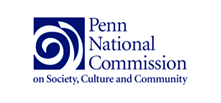
Key Findings of the Penn National Commission
As of December 2000
The following are some of the key ideas that have emerged from the
Commission's work. These ideas have played a central role in determining
our plans for the future:
- Incivility Is Not New
Incivility and coarseness are a continuation of behaviors that have
always been with us. However, these behaviors are greatly amplified by
the new economic dynamics of mass markets, by the new technologies of
mass communication, and by laissez-faire governmental policies.
- The Centrality of Public Discourse
Effective public discourse, or "public talk," plays a central
role in the functioning of a well-ordered democratic society and can facilitate
productive dialogue on such "hot-button" issues as immigration,
race, abortion, and affirmative action. The processes of engaged, productive
public discourse de-sensitize such issues and facilitate co-existence,
even in the face of frank opinions and irresolvable disagreements.
- The "Thinning" of Public Discourse
Population growth, technological change, mass migrations, economic
development, widespread literacy and education, and a plethora of new
and sometimes unfamiliar voices in the cultural mix have made public discourse
more diffuse, "thinning" it, in the words of historian and commission
member Thomas Bender. As a result, "bad" discourse sometimes
seems louder and more dominant, while productive public talk can be harder
to hear, recognize, and participate in. The Commission's recommendation
is the "thicken" public discourse by surrounding uncivil behaviors
with a wealth of constructive and energetic public debate.
- Effective Public Discourse Has Changed
A useful formulation of what constitutes effective public discourse
emerged from a review of the scholarly literature on this subject prepared
for the Commission by Dr. David M. Ryfe of the University of California
at San Diego. Ryfe says that while traditionally good discourse has been
interpreted solely as rational argument, today good deliberative discourse
integrates rational arguments with narratives, personal experiences, expressions
of emotion, and empathetic listening. Discourse fashioned along these
lines will be argumentative -- but argumentative in a way that seeks to
achieve greater inclusion and stronger communal bonds.
- Different Institutions Playing a More Important Role
The Commission has concluded that a variety of social and cultural
institutions -- from neighborhood cultural institutions, community foundations,
and local museums, historical societies, libraries, and universities to
corporations, sports teams, and the military -- have assumed new and important
roles in creating "communities of conversation" among increasingly
isolated individuals and groups. Historically, many of these organizations
have not seemed central to the creation of a sense of community or to
the provision of forums where citizens can engage in frank public dialogue.
In many instances, these organizations now fill the gaps left by social
and cultural changes, creating and engaging diverse communities and using
their professional resources to foster productive public discussion.
- The Importance of Effective Discourse Leadership
The Commission's analyses of the public discussions surrounding major
policy issues such as affirmative action, campaign finance reform, immigration,
health care, tobacco, civic journalism, and arts funding have highlighted
the crucial role that leaders in all walks of life play in shaping and
setting the tone for public talk. Preliminary research sponsored by the
Commission suggest that even small improvements in such leadership can
reduce conflict and stabilize communities.
- Creating Communities of Conversation
Public culture is the place where we constantly negotiate the boundaries
of privacy and public interest and the tensions created by different visions
of the public good. The Commission has concluded that these is a need
for a more active and self-conscious effort -- a national movement --
to foster a public culture that supports the building of strong, inclusive
communities through substantive, honest, and productive public conversation.
© 2000 Trustees of the University
of Pennsylvania. The materials available on this website are not to be
duplicated or redistributed without the express written permission of
the Penn National Commission on Society, Culture and Community.
